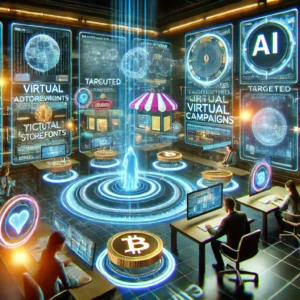Rapid advancements in technology are reshaping the digital landscape, and two of the most transformative innovations are the Metaverse and Web3. These emerging technologies are poised to redefine how businesses connect with their audiences, offering immersive experiences, enhanced interactivity, and decentralised systems. As brands adapt to these changes, digital marketing strategies must evolve to leverage the opportunities presented by the Metaverse and Web3. In this blog, we will explore how the Metaverse & Web3 will impact digital marketing and what businesses can do to stay ahead in this evolving space.
You may like to read: How Startups Are Disrupting Digital Marketing in the UK
Understanding the Metaverse and Web3
Before diving into the impact on digital marketing, it is essential to understand what the Metaverse and Web3 are. The Metaverse refers to a virtual, immersive space where users interact using digital avatars, augmented reality (AR), and virtual reality (VR). It creates a highly engaging environment where brands can offer unique experiences beyond traditional digital platforms.
On the other hand, Web3 is the next generation of the internet, characterised by decentralisation, blockchain technology, and enhanced user control over data. Unlike Web2, which relies on centralised platforms like social media and search engines, Web3 empowers users with greater privacy, security, and autonomy over their digital interactions.
The Metaverse & Web3 Will Impact Digital Marketing: Key Transformations
1. Immersive Brand Experiences
One of the most significant ways the Metaverse & Web3 will impact digital marketing is by enabling brands to create immersive experiences. Traditional online marketing relies on 2D content such as websites, social media posts, and videos. However, the Metaverse introduces 3D environments where brands can engage with consumers in virtual spaces.
For instance, companies can set up virtual stores, host product launches in digital worlds, or create branded games. Consumers can interact with products, explore virtual showrooms, and even try items before making a purchase. This heightened engagement leads to stronger brand recall and customer loyalty.
2. Decentralised Advertising and Data Privacy
Web3’s decentralised nature is reshaping digital marketing by shifting control from tech giants to individual users. Currently, advertising relies on centralised platforms that collect user data for targeted marketing. However, with Web3, blockchain technology ensures data privacy, giving users control over their personal information.
Marketers will need to adopt permission-based advertising, where users voluntarily share their data in exchange for rewards. This shift fosters trust and transparency, leading to more meaningful customer relationships. Additionally, blockchain-powered smart contracts can automate ad transactions, ensuring fair compensation for content creators and eliminating fraud.

3. NFTs and Digital Ownership
Non-fungible tokens (NFTs) are revolutionising digital marketing by providing unique digital assets that consumers can own and trade. Brands can leverage NFTs to create exclusive content, loyalty programs, and limited-edition digital collectibles.
For example, fashion brands can release virtual outfits as NFTs, allowing users to customise their avatars in the Metaverse. Similarly, companies can issue NFT-based membership cards that grant access to VIP events, discounts, and special offers. By integrating NFTs, brands can enhance customer engagement and build strong communities around their products.
4. Enhanced Customer Engagement Through Gamification
Another way the Metaverse & Web3 will impact digital marketing is through gamification. Gamified experiences encourage active participation, making marketing campaigns more engaging and memorable. Brands can create interactive challenges, virtual quests, and reward-based programs within the Metaverse.
For instance, companies can launch scavenger hunts where users explore virtual spaces to unlock exclusive discounts or products. Gamification not only drives brand interaction but also fosters a sense of community as users collaborate and compete in brand-related activities.
5. Influencer Marketing in Virtual Worlds
Influencer marketing is a powerful tool in digital marketing, and the Metaverse is taking it to new heights. Virtual influencers and AI-generated personalities are gaining traction, allowing brands to collaborate with digital entities for promotions.
Moreover, human influencers can engage with audiences through virtual events, live streams, and interactive experiences. Brands can sponsor Metaverse meetups, where influencers showcase products in an engaging and authentic manner. This evolution in influencer marketing ensures deeper connections with audiences in an immersive setting.
6. Cryptocurrency and Token-Based Economy
As Web3 introduces decentralised finance (DeFi) and cryptocurrency transactions, digital marketing strategies must adapt. Many Metaverse platforms operate on digital currencies, enabling seamless transactions within virtual ecosystems.
Brands can create their own tokens to reward customers for engagement, loyalty, and purchases. For instance, users who interact with a brand’s virtual space or share content could earn tokens redeemable for products or services. This innovative approach enhances customer retention and encourages participation in brand communities.
You may also like: Leveraging Short-Form Video Content in UK Digital Marketing
Preparing for the Future of Digital Marketing
To thrive in this new digital era, businesses must proactively embrace the changes brought by the Metaverse and Web3. Here are some steps marketers can take:
- Invest in AR and VR Technologies: Businesses should explore AR and VR tools to create immersive brand experiences that captivate audiences.
- Leverage Blockchain for Transparency: Implement blockchain-based solutions for secure transactions, data privacy, and smart contracts.
- Develop NFT Campaigns: Experiment with NFT-based loyalty programs, collectibles, and exclusive content to enhance customer engagement.
- Adapt to Decentralised Advertising: Shift towards permission-based marketing strategies that prioritise user consent and trust.
- Engage with Virtual Influencers: Collaborate with Metaverse personalities to drive brand awareness and authenticity.
- Explore Cryptocurrency Integration: Accept crypto payments and develop token-based reward programs to attract tech-savvy consumers.
Conclusion
The Metaverse & Web3 will impact digital marketing in profound ways, offering brands unprecedented opportunities for engagement, innovation, and customer loyalty. As these technologies continue to evolve, marketers must stay ahead by embracing immersive experiences, decentralised advertising, NFTs, and gamification. By adapting to these changes, businesses can position themselves as pioneers in the digital revolution and create meaningful connections with their audiences. The future of digital marketing is here, and those who seise the potential of the Metaverse and Web3 will lead the way in the new digital economy.
Get Personal Branding with complete interview assistance for UK jobs: www.brandme4job.com
Get your CV checked and improve it with section based detailed recommendation, for free: Brand Me 4 Job Free CV Check!
Join www.stunited.org to build a wide network in the United Kingdom.
Contact us to get Career Assistance in the UK: Call Us Now!
To get regular job, career and industry updates along with important UK jobs related information, follow us on: Instagram, LinkedIn & Facebook




